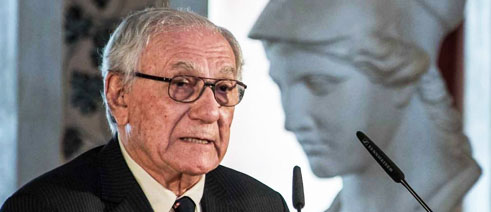Syrian philosopher Sadiq Jalal al-Azm passed away in Berlin
on Sunday, 11 December 2016. Al-Azm had already been living in German exile before
civil war erupted in his homeland in the wake of the 2011 Arab Spring.
Although working mainly as an academic philosopher, Sadiq
al-Azm also spoke and wrote about politics. Member of the prominent Damascene
al-Azm family, which has produced generations of scholars and influential
political figures, al-Azm positioned himself on the left and became an
outspoken critic of the Assad government, when it became clear in 2000 that
Hafiz al-Assad’s family and his wider Alawi clan were turning a military regime
into a hereditary dynasty. For that reason, he also became one of the
signatories of the 2005 ‘Damascus Declaration’, and later decided to join the
Committee for the Revival of Civil Society’.
Although mainly regarded as a representative of the
political left, Al-Azm has also written perceptively about religion and engaged
critically with the challenge of Orientalism by peer such as Edward Said. This
also forms the wider context for his decision to throw his intellectual weight
behind opposition to the Assad regime that had its origins in the mosque. In an
interview he gave in 2013, he explained that he did not regard this as giving up
his advocacy of secularisation or his Marxist convictions. He still finds
Marx’s classical analysis convincing, but believes that its interpretation and
implementation along the lines of Franz Fanon are more relevant to a country
like Syria. This is also the reason for his sympathy for the Catholic
Liberation Theologies emerging in Latin America and even for the Iranian
Revolution of 1979, which also included a very significant leftist component
until its hijacking by the Islamists, which turned Iran into a ‘Mollahcracy’.
Al-Azm has always cautioned against having exaggerated
expectations of what revolutions can accomplish. Structural changes to cultures
are difficult to achieve and are the outcome of slow socially cumulative
historical processes. In this regard, he pointed at argumentations put forward
by other Syrian intellectuals like Jamil Saliba, Anton Makdisi and Tayyib
Tayzini, as well as progressive thinkers from elsewhere, including his fellow
philosopher Muhammad Abid al-Jabri and the historian Abdullah Laroui from
Morocco, and the Egyptians Fouad Zakariyya and Nasr Hamid Abu Zayd.
As to the ideological dimensions for effecting drastic
changes to a culture and society, al-Azm stresses that the key to success lies
in secularisation and the creation of civil society, that is to say creating a
sense of citizenship that overrides religiously-inspired one-dimensional
identities.
A useful overview of the various stages of al-Azm’s
intellectual life can be found
here.
For some of al-Azm's publications, click on the widget below:



1 comment:
Nice Post
Islamic News,Video Naats,Movies,Bayans etc
Post a Comment